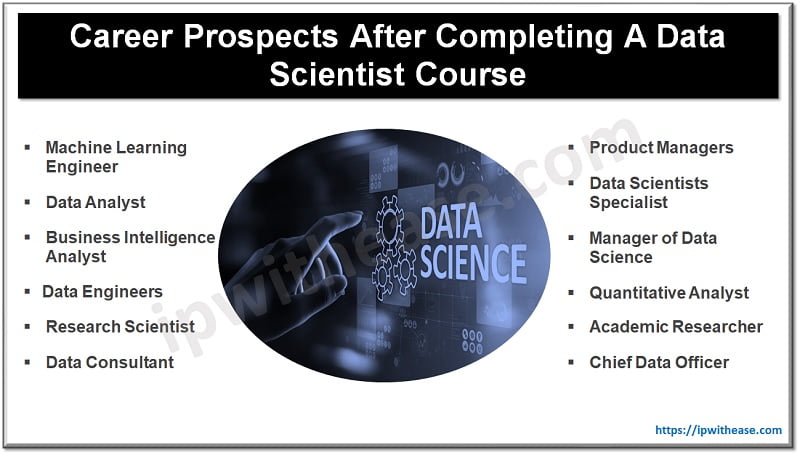Table of Contents
The completion of a course in data science paves the way for a diverse array of career opportunities across a variety of fields and markets. As more and more businesses become aware of the benefits of basing their decisions on data, there has been an increase in the demand for skilled data scientists. You can pursue a career as a data scientist if you have completed training in data science. This training will prepare you for the job.
Career Prospects after a Data Scientist Course
Data scientists are tasked with the responsibility of collecting, analyzing, and interpreting large datasets in order to derive insights and make recommendations that are driven by the data. They use skills in statistical analysis, machine learning, and programming to develop predictive models and algorithms that drive business decision-making. These models and algorithms drive business. After successfully completing a data scientist course, you may want to consider the following professional options:

Data Analyst:
Because data scientist courses frequently cover methods of data analysis, graduating from one of these programs will prepare you exceptionally well for a career as a data analyst. Master’s in data analytics from a good institute is recommended to make a career as data analyst. Data analysts are responsible for the collection, cleaning, and transformation of data, as well as the performance of statistical analysis, with the end goal of identifying patterns, trends, and insights. They produce reports and visualizations that communicate findings to stakeholders, thereby assisting businesses in making decisions that are based on accurate information.
Machine Learning Engineer:
Because machine learning is such an important part of data science, taking a course in data science can provide a solid grounding for those interested in pursuing a career in this field. Engineers who specialize in machine learning are responsible for developing and putting into practice various machine learning models and algorithms. They collaborate closely with data scientists to implement machine learning systems that are responsible for driving automation, predictive analytics, and decision-making processes.
Business Intelligence Analyst:
A course in data science will teach you techniques for business intelligence analysis, data visualization, and data storytelling. These skills are necessary for the business intelligence analyst role. As a business intelligence analyst, one of your primary responsibilities would be to make use of various data and analytics tools in order to derive insights and compile reports that assist in the organization’s process of making strategic decisions. You would collaborate closely with the stakeholders to determine the needs of the business and provide solutions that are data-driven.
Data Engineers:
Engineers who specialize in data are called data engineers, and their duties include the planning, construction, and upkeep of data infrastructure and systems. The successful completion of a course in data science equips you with a comprehensive knowledge of the methodologies underlying data manipulation, data storage, and data processing. This knowledge is beneficial for roles that focus on the integration of data, the management of databases, and the development of data pipelines.
Research Scientist:
Data scientists frequently participate in research and development efforts in a variety of contexts, including academic and commercial organizations. After successfully completing a course in data science, you will be equipped with the skills necessary to design experiments, conduct research, and analyze data for scientific purposes. Research scientists contribute to the advancement of data science by working on cutting-edge projects, developing new methodologies, and working on other innovative projects.
Data Consultant:
After completing a course in data science, you may want to consider a career as a data consultant, in which you provide organizations with advice and assistance based on your knowledge and experience. As a data consultant, your job would be to evaluate the information requirements of a company, come up with data strategies, and make suggestions regarding the data collection, analysis, and application processes. You would collaborate with customers to find solutions to complicated data-related problems and drive business
Product managers:
product managers act as a bridge between technical teams and business stakeholders. They use their knowledge of data science and analytics to define and direct the development of data-driven products and solutions, which they then use in their work. You could pursue a career as a data product manager after completing a course in data science. In this role, you would be responsible for the strategic planning, development, and launch of data-focused products or services.
Data Scientists Specializing in a Particular Industry:
Many different industries, including healthcare, finance, marketing, retail, and technology, have specific requirements for data scientists. You will be able to specialize in a particular industry by completing a data scientist course, which will allow you to leverage your skills to address challenges that are unique to that industry. You could, for instance, become a healthcare data scientist, in which case you would use data analysis and machine learning to either improve the outcomes for patients or optimize the operations of healthcare organizations.
After completing a course in data science, you will be equipped with the skills necessary to either launch your own data-driven business or work as a freelance consultant. There are many companies that need expertise in data science, but those companies may not have the resources to employ a data scientist full-time. If you are an entrepreneur or a consultant, you have the opportunity to offer data science services to clients on a project basis. These services can include data analysis, predictive modeling, and strategy development.
Manager of Data Science or Leader of a Team:
You can advance to managerial positions if you have advanced knowledge in data science and you gained that knowledge from taking a data scientist course. You would be responsible for supervising a group of data scientists, analysts, and engineers if you were a data science manager or team lead. You would be in charge of directing projects, formulating strategies, managing resources, and making sure that data-driven initiatives are carried out effectively and efficiently.
Quantitative Analyst:
Taking a course in data science will provide you with the skills necessary to perform quantitative analysis, which is highly sought after in the finance, investment, and trading industries. In your role as a quantitative analyst, you would be responsible for performing data analysis using statistical models and mathematical algorithms in order to assess risks and make educated decisions regarding investments. You would work very closely with traders, portfolio managers, and teams responsible for risk management.
Journalists who specialize in data analysis are becoming increasingly desirable in the field of journalism. After successfully completing a course in data science, you will be equipped with the knowledge and skills necessary to collect, examine, and visualize data for journalistic purposes. Investigative reporting, data-driven storytelling, and data visualization are all important skills for a data journalist to have in order to convey complicated information to the general public effectively.
Academic Researcher:
Completing a course in data science can open doors to opportunities in research as well as in academic settings for those who are interested in pursuing a career in the academic world. Contributing to academic institutions can be accomplished through the conduct of research in the field of data science, the publication of scholarly papers, and the teaching of courses in data analysis and statistics to students.
Chief Data Officer (CDO):
As companies become more aware of the strategic significance of data, the role of the Chief Data Officer (CDO) is becoming more commonplace in these companies. A course in data science can put you in a position for senior leadership roles, such as chief data officer. In this position, you would be responsible for developing and implementing data strategies, ensuring data governance and compliance, and driving data-driven decision-making at the executive level of the organization.
Summary
The coursework required to become a data scientist opens the door to a wide variety of employment opportunities. Your skills and knowledge in data science will be highly valued, regardless of whether you decide to pursue a career as a data scientist, data analyst, or machine learning engineer or whether you explore industry-specific roles. Completing a course in data science puts you in a position to thrive in this dynamic and rapidly developing field, as it positions you to take advantage of the growing demand for data-driven insights across a wide range of industries.
Continue Reading:
What is Data Science? Life Cycle, Applications & Tools
Key Principles of MLOps (Machine Learning Operations)
ABOUT THE AUTHOR
IPwithease is aimed at sharing knowledge across varied domains like Network, Security, Virtualization, Software, Wireless, etc.



